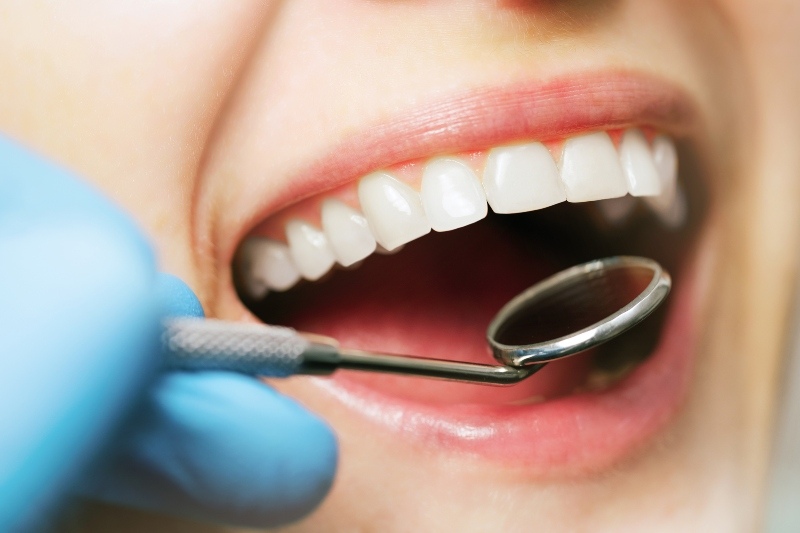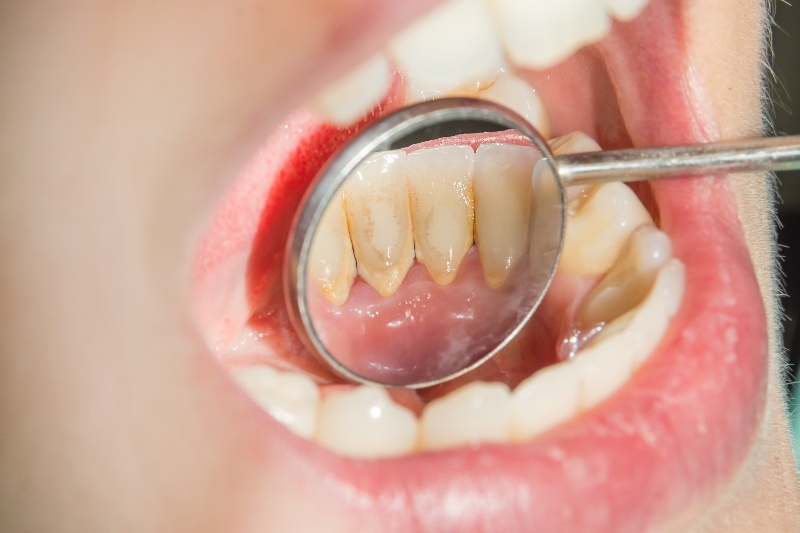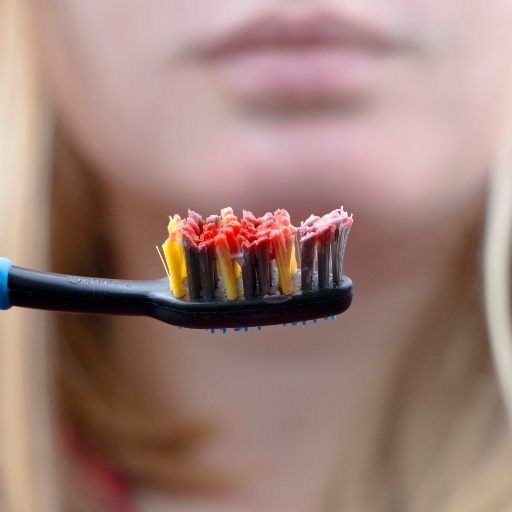 It’s not an uncommon practise to shrug off a bleeding gum as something minor. However, it can be an indication of an underlying condition. Identifying and treating the underlying cause can be the best way to manage bleeding gums.
It’s not an uncommon practise to shrug off a bleeding gum as something minor. However, it can be an indication of an underlying condition. Identifying and treating the underlying cause can be the best way to manage bleeding gums.
What you need to know:
- What are bleeding gums?
- Causes of bleeding gums
- Symptoms of bleeding gums
- Home remedies for bleeding gums
What are bleeding gums?
 Bleeding gums is a health condition wherein the soft tissues surrounding your teeth (gums) bleed when brushing and flossing. Typically, bleeding gums are caused by the buildup of excess plaque in your mouth. It is a common dental problem and can be an early sign of oral health issues such as gingivitis and periodontitis. Bleeding gums can also be a warning sign for type 1 or 2 diabetes. High blood sugar levels lead to higher glucose levels in saliva, creating an ideal environment for bacteria to thrive in the mouth. Also, diabetes slows down the body’s ability to heal itself. Therefore, gum problems may persist for a long time.
Bleeding gums is a health condition wherein the soft tissues surrounding your teeth (gums) bleed when brushing and flossing. Typically, bleeding gums are caused by the buildup of excess plaque in your mouth. It is a common dental problem and can be an early sign of oral health issues such as gingivitis and periodontitis. Bleeding gums can also be a warning sign for type 1 or 2 diabetes. High blood sugar levels lead to higher glucose levels in saliva, creating an ideal environment for bacteria to thrive in the mouth. Also, diabetes slows down the body’s ability to heal itself. Therefore, gum problems may persist for a long time.
Causes of bleeding gums
Here are some of the major causes of bleeding gums:
Poor oral hygiene
Unhealthy oral hygiene practises are one of the primary causes of bleeding gums. When you do not take adequate care of your oral hygiene, plaque builds up on your teeth, resulting in oral complications. If you don’t clean your teeth after every meal, harmful bacteria in your mouth can cause tooth decay and even spread through your body, causing infections. Good oral hygiene habits like regular brushing can reverse bleeding gums and prevent complications like periodontitis.
Gum disease
When you don’t brush or floss, a sticky layer of harmful bacteria gets deposited on your gums, also known as plaque. It enables the growth of more bacteria and leads to inflamed gums and bleeding. This condition is also known as gingivitis. When gingivitis is not taken care of, it leads to a jaw bone disease known as periodontitis, a serious oral condition requiring immediate treatment, such as scaling and root planing. Regularly check your oral health to detect and manage gum disease early, preventing further complications.
Vitamin deficiencies
Deficiencies of Vitamin C and K can cause your gums to bleed easily. If you think you are taking enough care of your oral health but are still experiencing bleeding gums, talk to your doctor about checking your vitamin C and K levels. Consider following a vitamin-rich diet to make sure that you stay healthy. It can comprise of:
- Citrus fruits and juices
- Broccoli
- Strawberries
- Bell peppers
- Olive oil
- Soybeans
- Canola oil
Symptoms of bleeding gums
Here are some of the symptoms of bleeding gums:
- Swollen gums
- Reddish gums from inflammation
- Gums bleeding while brushing and flossing
- Tender gums
- Bad breath
Home remedies for bleeding gums
 Here are some of the best home remedies for bleeding gums:
Here are some of the best home remedies for bleeding gums:
Maintain oral hygiene
Maintaining excellent oral hygiene is one of the easiest ways to manage bleeding gums. Regular brushing (at least twice daily) and flossing (once daily) will enable you to remove plaque and prevent gum inflammation. Use a soft-bristle toothbrush and gentle, circular motions to avoid further irritation.
Saltwater rinse
Rinse your mouth with warm saltwater four times a day to reduce harmful bacteria in your mouth and speed up your body’s natural healing. Salt comprises antiseptic properties that can reduce inflammation and promote fast healing.
Intake of Vitamin C
Not getting enough Vitamin C in your diet can intensify bleeding, especially if you already have gum disease. Consider eating foods rich in Vitamin C, including red peppers, carrots, sweet potatoes and oranges. Because of its antioxidant properties, vitamin C protects the lining of your gums against harmful bacteria and strengthens your connective tissues. The recommended daily vitamin C intake is around 65 and 90 milligrams per day.
Intake of Vitamin K
Adding vitamin K to your diet can help you manage bleeding gums, mainly because of its efficiency in clotting blood. Add green veggies like spinach, collard, and mustard greens to your diet to alleviate inflammation and gum diseases. The recommended daily vitamin K intake is around 90 to 120 milligrams daily.
Use of hydrogen peroxide
If you are experiencing bleeding gums, rinse your mouth with hydrogen peroxide for immediate results. It can not only remove plaque but also stop your gums from bleeding. You can also use hydrogen peroxide to use as a disinfectant.
Tea tree oil
Tea tree oil, or Melaleuca oil, can help you manage bleeding gums due to its natural antibacterial and anti-inflammatory properties. Tea tree oil features terpinen-4, a compound that exhibits antibacterial properties. If you use it as a mouthwash, it can reduce the population of harmful oral bacteria. It is one of the famous home remedies for bleeding gums that reduces gum tenderness and makes them firmer.
Stop smoking
Not only does smoking increase your risk of getting lung cancer, heart disease and strokes, but it also causes inflammation, causing damage to your gums. In addition, smoking also decreases your immunity, making it harder for your body to fight the harmful bacteria in your mouth, leading to gingivitis and gum conditions. Quit smoking to let your gums heal, which will stop your gums from bleeding gradually. You can try using chewing gums and healthy distractions like sporting activities to quit smoking.
Use of cold compress
Gums can also bleed because of severe injuries to your gum tissues. In that case, apply a cold compress to your gum lines for 20 minutes 6-8 times daily to see the best results.
Bleeding gums are a warning sign, signalling underlying issues requiring early attention and swift care. Home remedies for bleeding gums can relieve and manage the symptoms of bleeding gums.
Stay tuned to the Activ Living Community. Keep up to date with the latest health tips and trends through expert videos, podcasts, articles, and much more in nutrition, fitness, mindfulness, and lifestyle conditions like Asthma, Blood Pressure, Cholesterol, and Diabetes.
You may also be interested in the following blogs:
- Oral health: A Window To Your Overall Well-Being
- Detect High Blood Pressure Symptoms With These Oral Symptoms
Popular Searches
How to lower blood pressure | Fruits good for liver | Unhealthy foods | Ragi Benefits | Basal Metabolic Rate | Acupressure points for High Blood Pressure | Ayurvedic medicine for blood pressure | How to control cholesterol at home | Homeopathy for Asthma | Biological Age | Home remedies for TB | Natural beta blockers | Negative effects of internet | Types of walking | Blood pressure calculator | Blood sugar calculator | BMI Calculator





 1800-270-7000
1800-270-7000











THANK YOU FOR PROVIDING THIS INFORMATION.